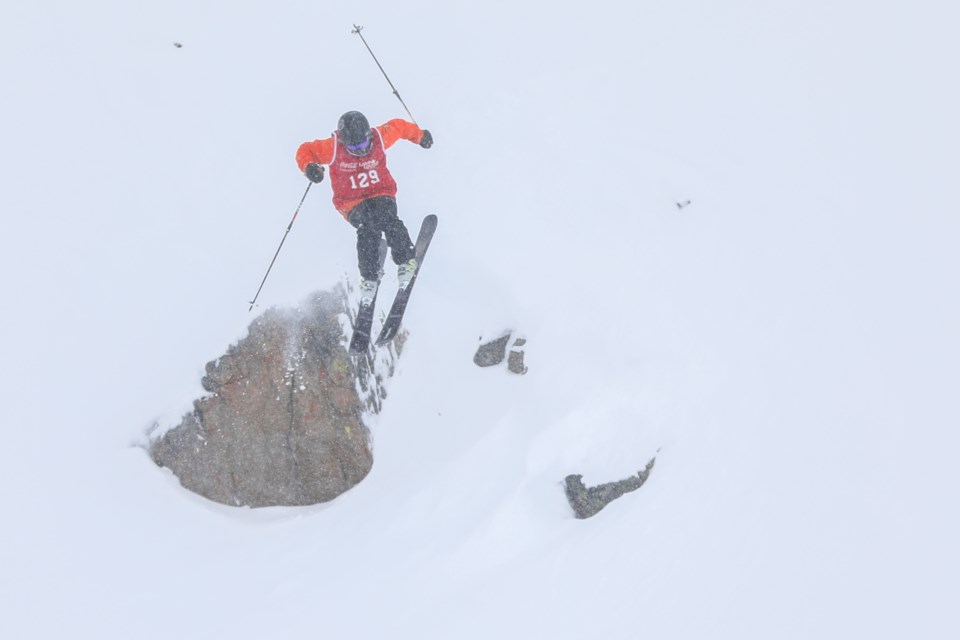BOW VALLEY – Freeride skiing and snowboarding is officially an International Ski and Snowboard Federation (FIS) discipline, putting it on track to become an Olympic sport.
The change has coaches and skiers rethinking what the fast-growing sport could become in Banff, Canmore, Lake Louise and Kananaskis Country.
“The Olympics have a pretty compelling aura and Canada’s a powerhouse in freeride,” said Jordy Burks, Ullr Big Mountain program director.
The announcement came at FIS’ annual meeting on June 5 in Reykjavik, Iceland, and was unanimously voted by its members.
“It’s a good discipline and it’s skiing, and we want to have the skiing family under the same umbrella,” said Michel Von, FIS secretary general, in an interview with the Outlook.
Von hopes freeride will be included in the 2030 Olympics, which would give big mountain skiers an ideal venue for a potential debut in the French Alps. But first, FIS will have to apply to have the discipline on the world stage in front of the International Olympic Committee. In 2022, FIS merged with the Freeride World Tour (FWT) as the first step on the Olympic road for the big mountain discipline.
With Canada and the United States already having strong freeride associations in place, Von said FIS will be adapting and working with the local organizations to “keep the sport how it is now.”
“There’s no intention to break everything and all the existing organizations. We really want to work with them and that will be the case for the next few months,” said Von. “We will try to adapt our system to their system.”
Von was unable to confirm if any World Cup or FIS events would happen in western Canada yet due to the work that needs to be done with the organizations. The International Free Skiers Association (IFSA) is the current governing body of freeride for North and South America and sanctions junior events and FWT qualifiers.
Back home on Bow Valley slopes, the change has been divisive in the community, Burks says.
“I think a lot of people, initially, just felt it would take the free out of freeride,” he said. “I was pretty conflicted, even alarmed, and then the more I’ve sat with it, reflected on it, then I am less so.”
For Burks’ team, it could mean a more regimented approach to training rather than before where it felt more like a day on the mountains with friends, and the coaches giving guidance and keeping a close eye for safety.
“Freeride has never really taken on the technical training that so many other sports have done,” he said.
“It’s, like, the least competitive sport I’ve been exposed to, and I’ve been in so many sports over my life, but you go to a competition and it just had more of a festival feel to it.”
With the nature of freeride being individual to each skier and boarder choosing their own style, tricks and routes down the mountain, Burks said it’s hard to imagine the structure, which could come if it is an Olympic sport. On the other hand, when he looks at other sports that have gone through similar changes, the spirit has remained.
“Things like mountain biking and Red Bull Rampage, even though there’s a fair amount of rehearsal now, it still has retained its spirit to a degree,” said Burks.
Seth Sands, a 15-year-old skier with Ullr, said he’s looking forward to having a new goal for his ski career.
“I think my biggest goal is just to compete on the Freeride World Tour, and I would still love to do that,” said the winner of the 2023 IFSA North American Freeride Junior Championship.
“But I think now the biggest goal is the Olympics.”
He said he’s ready for the changes in coaching style and is looking forward to sending big cliffs next season with the rest of the U19s.
“I just want to focus on my game,” said Sands. “Especially throughout the summer, just getting stronger, so I’m able to put down some solid runs in 24-25 season,” said Sands.
Burks said freeride has been exploding in popularity in the last couple of years, with his program reaching 160 athletes.
“I can never keep up to it. I’m always turning people away,” said Burks.




.png;w=120;h=108;mode=crop)